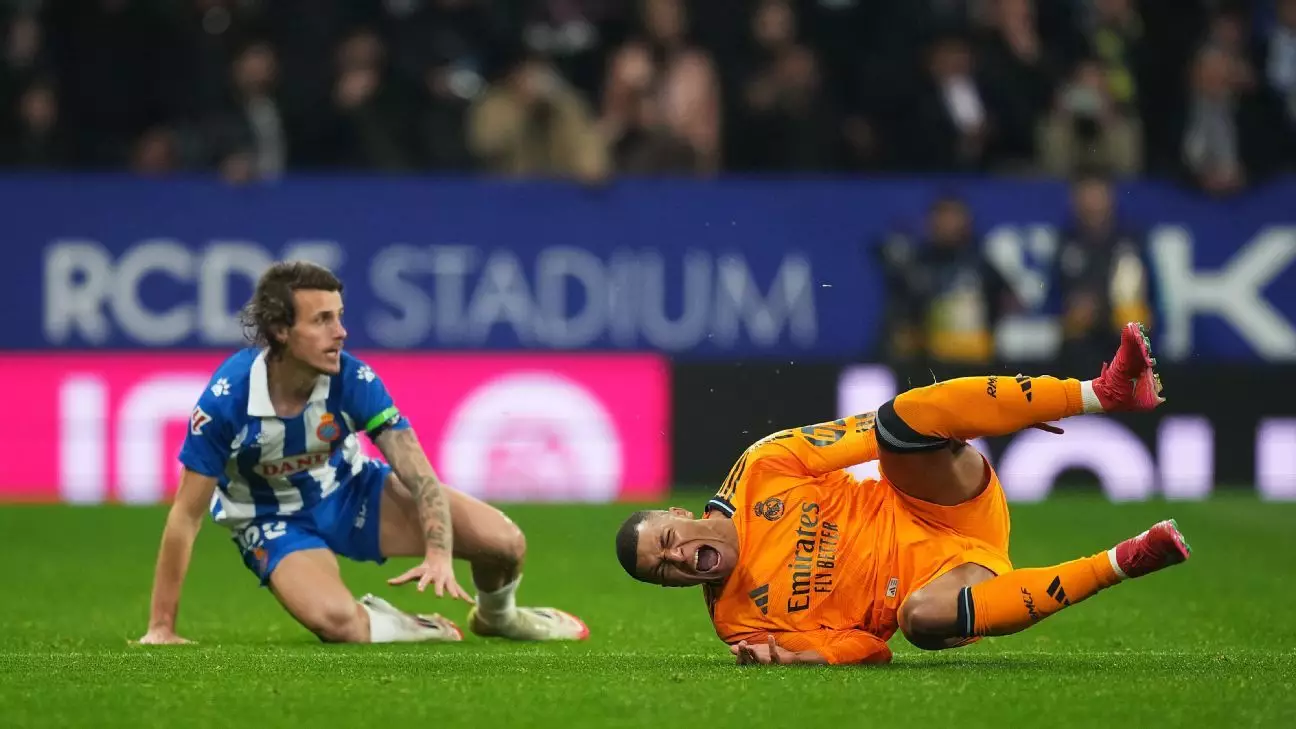In the high-stakes environment of LaLiga, where every point counts in the race for the title, Carlo Ancelotti’s outburst against the officiating in Real Madrid’s 1-0 loss to Espanyol on Saturday reverberated beyond the pitch. His frustration centered on the referee’s decision not to issue a red card to Espanyol defender Carlos Romero for a tackle that many deemed reckless. Romero’s subsequent performance, which culminated in his scoring the game-winning goal, only fueled the fire of Ancelotti’s indignation. The event sheds light on the broader issues of officiating inconsistencies, accountability in a virtual review system, and the protection of player safety in such pivotal moments.
In the 61st minute of the match, Kylian Mbappé, sprinting down the field for a potentially game-altering counterattack, was met by Romero’s harsh challenge from behind — an act that many spectators and analysts viewed through the lens of justification for a red card. Yet, referee Alejandro Muñiz Ruiz opted only for a yellow. This choice sparked controversy, prompting Ancelotti to label the officials’ actions as “inexplicable.” Acknowledging that the primary purpose of VAR (Video Assistant Referee) is player protection, Ancelotti’s critique shines a spotlight on how the system can falter under pressure, leaving players vulnerable to dangerous tackles without recourse.
Romero himself expressed regret over the foul, admitting to DAZN that his challenge was “a bit ugly” and that he had subsequently apologized to Mbappé. This highlights an important aspect of sportsmanship, but it also poses a question — should an apology suffice when a player’s safety is at risk? Moreover, the sentiment echoed by Espanyol’s coach, Manolo González, that the challenge was not intended to harm, is tempered by the reality that the repercussions of such actions can never truly be measured by intent alone.
Despite the officiating controversy, Real Madrid exhibited a commendable performance in other respects. Ancelotti noted their dominance in ball possession and the number of chances created — reporting 20 shots on goal and even striking the woodwork. It reveals a significant truth about Madrid’s playstyle: they are consistently dangerous, even when the outcomes don’t favor them. Yet, this narrative complicates itself when reviewing how fine margins in football often dictate the trajectory of a season.
The disallowed goal by Vinícius Júnior in the first half, ruled out due to a foul by Mbappé, further complicated Madrid’s situation. Ancelotti’s acknowledgment of the team’s resilience amidst frustrations indicates a crucial understanding of the psychological strains of modern football. In high-tension matches, every call can lead to shifts in momentum, and decisions — especially those perceived as erroneous — can galvanize a team’s resolve or leave them deflated.
The injury woes of Real Madrid compounded their struggles in this match. Losing key defender Antonio Rüdiger early in the game meant one less experienced body to maintain a cohesive defense. With additional absences like Dani Carvajal and Éder Militão, and David Alaba just returning from injury, the squad’s depth was tested at critical junctures. Ancelotti’s acknowledgment of Rüdiger’s muscular injury adds an additional layer to the managerial challenges he faces in a congested schedule, which includes crucial fixtures against Leganés, Atlético Madrid, and Manchester City in the following weeks.
With the transfer window looming, Real Madrid must quickly assess their needs to bolster a defense that appears stricken by injuries. This element highlights another intersection between finance and sporting excellence; the club’s ability to navigate the market for reinforcements amidst such adversity could be pivotal in their hunt for silverware this season.
Ultimately, Ancelotti’s post-match sentiments go beyond the disappointment of one game. They reflect a broader anxiety within professional football related to refereeing standards and player safety. While Espanyol savored an unlikely victory, for Madrid, the loss placed them precariously close to their rivals Atlético Madrid, amplifying the pressure as they enter demanding fixtures. In football, each match is a culmination of individual actions, collective resilience, and often, the whims of fate tied deeply to the officials’ decisions. As the seasons progress, clubs like Real Madrid and Espanyol will continue to grapple with these very dynamics, each encounter shaping the larger narrative of their campaigns.

